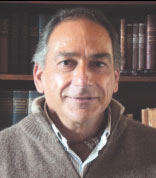 Dr José Foglia
MD
Dr José Foglia
MD
Dr Foglia grew up and was educated in Punta del Este and
in Montevideo where he attended the Deutsche Schule.
He graduated in 1979 as a doctor from the Medical School
of Montevideo and specialized in General Surgery and
Hemotherapy. He also became interested in acupuncture
and other health-related therapies. For 5 years he taught
Biology and Pathophysiology at The School of Nursing.
He joined the Theosophical Society in 1978 and became
interested in the teaching of Jiddu Krishnamurti who he
met on his trips to India. Following these visits he decided
to travel to various countries to learn about other cultures
and ancient civilizations.
In 1983 he moved to Montpellier in France for 3 years to
study General Surgery and related techniques in
Hemotherapy. In 1987 he moved to Rome Italy to
continue his medical studies at the Catholic University
Medical Faculty and subsequently stayed in Europe until
1996.
On returning to Montevideo he dedicated his time to
studying the link between the psyche and the body.
While at the Faculty of Medicine of Punta del Este he
continued his studies graduating in
psychoneuroendocrineimmunology in 2012. He published
his monograh on 'The Neurophysiology of Meditation'.
From 2002 to 2010 he researched and published a book,
'Homo Lux'. Currently Dr Foglia is working to investigate
the human potential and developing a new approach to
medicine.
2018 - (Pre-conference)The Meditating Brain, a Challenge to the Digital Revolution
(Conference)Why is it so difficult to achieve the State of Meditation? A view from Neuroscience
The Meditating Brain, a Challenge to the Digital Revolution.
In a few years the Digital Revolution will change our world completely. It will change our society and also the human brain. Big Data & Algorithms working together will make it possible for mankind to have useful information, faster, with increased accuracy in all different fields of the human life.
Is our brain prepared to receive this huge revolution?
The results of potential abuse are now showing in the younger generation manifesting in attention deficit, poor development of the working memory, less empathy in human relationships. This increasing stress is affecting their health.
We could call this process of human deterioration as Digital Dementia.
Psychiatrists and psychologists are alerted to the increase of anxiety, frustration, depression, and suicides in young people. Scans of the brain are showing less activity in areas of the prefrontal lobes, insula, hippocampus, and increasing activity in the amygdala.
How we can counteract this situation? We can practice Meditation - this will improve our attention, memory and overall health. Meditation is known to reverse the signs of stress.
This seminar approaches all of these subjects from the view of the neuroscience and includes meditation practices.